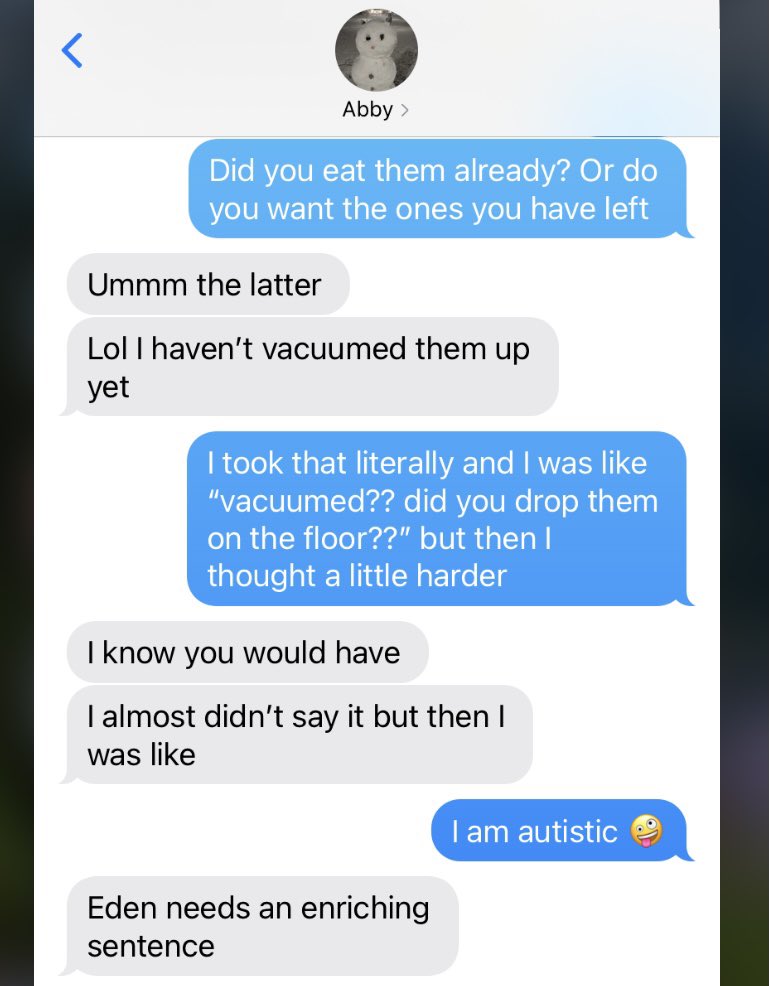
SPOILER WARNING for Soul.
I watched the Pixar movie Soul with my family last night, and I really enjoyed it.
I think one of the reasons I loved it so much, was that 22’s experience of life in Joe’s body was so reminiscent of autistic people’s experience of life every day.
I watched the Pixar movie Soul with my family last night, and I really enjoyed it.
I think one of the reasons I loved it so much, was that 22’s experience of life in Joe’s body was so reminiscent of autistic people’s experience of life every day.
22 has never experienced life before, so she comes into every situation as an outsider.
She’s not aware of social rules, so she does things that Joe would never do, or that seem “odd.”
She’s never had a body before, so her senses are extremely heightened.
She’s not aware of social rules, so she does things that Joe would never do, or that seem “odd.”
She’s never had a body before, so her senses are extremely heightened.
Because everything is new to her, 22 is very sensitive and easily overwhelmed by sensory stimuli.
She gets frightened by crowds of people, sirens, loud noises, etc. in NYC and then ends up running away due to sensory overload (which could be viewed as elopement).
She gets frightened by crowds of people, sirens, loud noises, etc. in NYC and then ends up running away due to sensory overload (which could be viewed as elopement).
She has a hard time coordinating movement in Joe’s body, because the sensations are so new and intense (motor planning difficulties).
She finds great joy in tiny details, and collects items (including a maple seed pod), because of the sensory experiences associated with them.
She finds great joy in tiny details, and collects items (including a maple seed pod), because of the sensory experiences associated with them.
If all of this sounds autistic to you, it’s because it is.
Recent science has demonstrated that autistic people’s experience of life is much more intense and continually surprising than the norm.
Much of this is explained by the “predictive coding” theory of autism.
Recent science has demonstrated that autistic people’s experience of life is much more intense and continually surprising than the norm.
Much of this is explained by the “predictive coding” theory of autism.
According to the predictive coding model of autism, autistic people have difficulty knowing what to expect in everyday life because sensory input overrides our brain’s model of what will happen.
So our brains are in a constant state of surprise, and we notice tiny details.
So our brains are in a constant state of surprise, and we notice tiny details.
In Soul, 22 comes into life without being desensitized by the process of aging.
And, surprise surprise, autistic people’s unique sensory experiences don’t go away with age.
So the way we experience life every day is similar to the way 22 experienced it.
And, surprise surprise, autistic people’s unique sensory experiences don’t go away with age.
So the way we experience life every day is similar to the way 22 experienced it.
After we finished watching the movie, my mom turned to me and said,
“When you were little you used to find tiny little things, and tell us to look at them. You were totally mesmerized. A lot of the time we’d get frustrated with you, but when we looked sometimes it was amazing.”
“When you were little you used to find tiny little things, and tell us to look at them. You were totally mesmerized. A lot of the time we’d get frustrated with you, but when we looked sometimes it was amazing.”
The lesson embedded in the movie is that living is a rich and vibrant experience, and people should enjoy every tiny detail while they have the chance.
I think autistic people have the capacity to show that truth to others, simply by being ourselves.
That’s a beautiful thing.
I think autistic people have the capacity to show that truth to others, simply by being ourselves.
That’s a beautiful thing.
• • •
Missing some Tweet in this thread? You can try to
force a refresh




